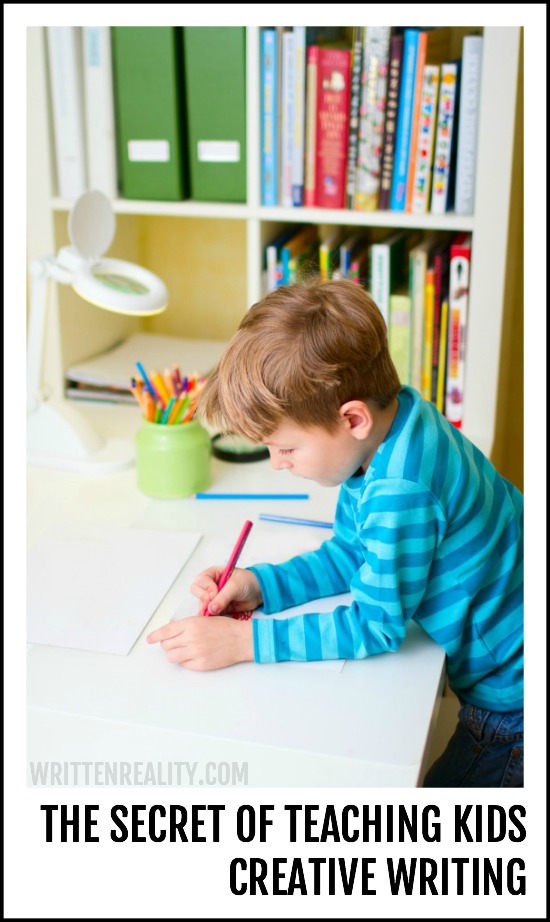Looking for ways to teach kids to write? There are no mathematical formulas. Writing is a process. Here’s the secret of teaching kids creative writing.
This post may contain affiliate links.
I’m a writer. I always have been. So for me, teaching kids to write was one of the greatest benefits as a third grade teacher. I could spend hours talking about the writing process and reveled in finding new ways to celebrate all of the wonderful authors I adored.
But for many parents and teachers, creative writing is understandably dreadful. After all, writing is an art form. It refuses to fit nicely within our educational boxes and can’t be defined by former grading systems or even taught through traditional worksheets or formulas we attempt to create.
So how can we teach our children creative writing? And more important, how can we motivate our children to explore writing on their own?
Here are some valuable lessons I learned through my own writing experience and how I applied them within the classroom so that my students fell in love with the process, too.
1. Writing is personal.
I once created a large banner from an old dot matrix printer that read:
We are the authors of our own life story.
I colored it with markers, displayed it across my classroom wall, and rehearsed its statement with my students over and over again.
Writing matters most when it’s personal. It gives us a voice to speak our mind, share our memories and experiences, and offer our unique perspective on our relationships and the world.
If we want children to care about writing, we must demonstrate its value. Allow them to begin writing within the context of where they are right now. Give them opportunities to share words about what matters, so they can discover its treasure for themselves.
We are the authors of our own life story. And we are the only ones who can live it and continue to write it out.
2. Writing is relational.
Writing is a powerful weapon. It’s been used to prompt and persuade its readers to do everything from start a war to lose weight.
But writing is only as powerful as those who receive it. It’s when the words prick our hearts and move us, or resonate so profoundly within us that we have no choice but to make a change.
Teaching creative writing goes far beyond keeping a diary for only our eyes to see. Rather, the true value is within allowing others to read it.
All of us should enjoy writing for ourselves, and I encourage everyone to keep a personal writer’s notebook that’s private where you can experiment with ideas on your own.
However, writing can only reach its potential when we share it with a hungry audience. When we provide our children with listeners who respect their words and care enough to ask questions and respond to what they’re trying to convey, they will begin to realize how much they have to say and the power they can wield from communicating effectively through their words.
3. Writing is a journey.
After all these years of writing, I am still learning to write. My writing changes with my experiences and grows as I continue to grow. Writing can never be taught effectively as an isolated subject or as a single lesson that will always stick, like riding a bike.
Just as every art form, writing takes many hours of practice. It can’t be rushed through some 10 minute drill each day or learned by the end of a school year to hopefully be retained for years to come.
The truth is, writing will never be mastered.
It’s a never-ending process of trial and error where we learn something new with every word of it–where we revisit and revise along the way.
Writing begins when we realize we have something to say to the world and thrives as an instrument pursuing whatever our purpose in this life may be.
The Secret of Teaching Kids Creative Writing
That’s the secret of teaching kids creative writing–give them a voice and an invested audience, then allow them time to explore with their words and write.
Teaching Writing Resources
Here are a few picture books I used as read alouds in my classroom to spark interest in writing, too:
Author: A True Story by Helen Lester
Great story conveying the reality of becoming an author and WHO an author can be.
Amelia’s Notebook by Marissa Moss
Wonderful book to use as an example of how to begin journaling so you can use those ideas later for stories and other writing.
What Do Authors Do? by Eileen Christelow
Here’s another great one to show the real life of an author and the writing process.
Shares the story of Grace who loves stories and uses her imagination to reach for her dreams.
Alexander and the Terrible, Horrible, No Good, Very Bad Day by Judith Viorst
A great example of how sharing even our bad days can make a great story.
Diary of a Worm by Doreen Cronin
This is just a funny little story and I laugh every time I read it. It’s another great opportunity to share how typical everyday experiences can create the best stories.
















I never felt like I was a great writer, especially creatively. I loved to read and was good at grammar though. My oldest enjoys writing. Thanks for the tips!
I love these tips. I really have to agree with you that writing is personal.